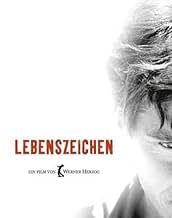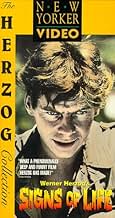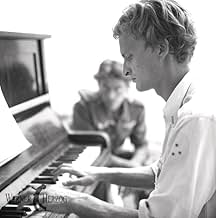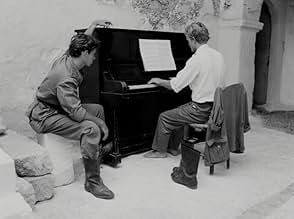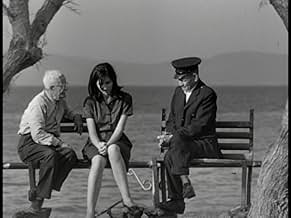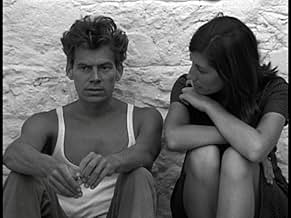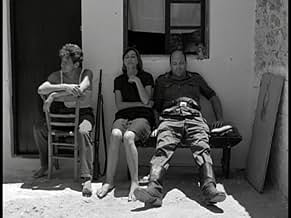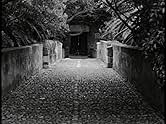AVALIAÇÃO DA IMDb
7,0/10
2,6 mil
SUA AVALIAÇÃO
Adicionar um enredo no seu idiomaThree wounded soldiers are removed from battle and given the task of looking after a fortress in a small coastal town. However, the pressures of isolation begin to take their toll on the men... Ler tudoThree wounded soldiers are removed from battle and given the task of looking after a fortress in a small coastal town. However, the pressures of isolation begin to take their toll on the men.Three wounded soldiers are removed from battle and given the task of looking after a fortress in a small coastal town. However, the pressures of isolation begin to take their toll on the men.
- Direção
- Roteiristas
- Artistas
- Prêmios
- 2 vitórias e 2 indicações no total
Werner Herzog
- Soldat
- (não creditado)
- Direção
- Roteiristas
- Elenco e equipe completos
- Produção, bilheteria e muito mais no IMDbPro
Avaliações em destaque
Werner Herzog's first film is a view into the mindset of the soldier who goes over the brink, but unlike many films that might explore the concept, or even Herzog's own later, arguably greater, Woyzeck, Signs of Life is about a man engulfed by the location. The setting is interesting right away; a stone fortress that men who have been wounded or just put on leave are guarding on a remote Greek island during WW2 (of course, we're never told this, which is appropriate, one can take a guess as to the significance of Herzog's POV as part of the New German cinema), and aside from the cockroaches and painting doors, there's not much to do. The mundane becomes engulfing, even as there's little things to do on the island. It's always bubbling under the surface, and as the days pass and things start to grow more aimless, Stroszek (Peter Brogle, with the kind of eyes and demeanor Kubrick would've loved to film) distances himself, sets of fireworks in his hands, and snaps one day out on patrol.
If anyone knows Herzog, the tale of a man going "berserk", as one officer says in this film of the main character, this shouldn't be seen out of the ordinary. Herzog has always tried to explore not so much of the precise 'whys' of the snap, or the break under pressure, or society's role or those around in personal quarters. Of course it's suggested a lot of the time, but in the case of Signs of Life we see much of the insanity in very long shots, with Stroszek going mad in the last twenty minutes on top of the fortress, wavering around, surrounded still by the immense landscape - an "inner" landscape, mayhap, as Herzog describes so often of his perspective on landscapes - of the fortress set against the background of the sea and mountains. But if one were seeing this as the first feature of some 26 year old Bavarian who only made a few shorts (one of which was similar somewhat to Signs of Life), this would seem like the most unclassifiable "genre" film ever made.
It's a movie about soldiers who don't fight, and with images like cut aways to peasants running and rummaging in the streets, a bird, a bunch of statues, stone tablets. And then when Stroszek does snap, we don't hear any audio, just the intense plucking of the guitar by the Greek composer, as Herzog pans over a whole field of windmills. And where else would one ever see something like when the bald soldier is setting up the trap for the roaches? Or the segway with the guy who thinks that he's a King? The first half of the movie is unsettling because it doesn't seem like it's going anywhere, and yet I kept on wanting to stay with Herzog (not even because I knew where it was going); there's something underneath all of the ho-hum "non" drama that goes on, little bits of behavior in the lackadaisical, that when finally things pick up dramatically it starts slowly, then builds, goes to a peak, and then...
Well, you'll just have to see for yourself. All I know is that you're likely not to see another film like Signs of Life- much less a debut from a major European film artist- where the climax entails fireworks going off while practical martial law is placed over the island. Herzog doesn't follow any rules, and it can get frustrating here and there. But it's also exhilarating, and I would probably count it in my top 10 favorites of the director.
If anyone knows Herzog, the tale of a man going "berserk", as one officer says in this film of the main character, this shouldn't be seen out of the ordinary. Herzog has always tried to explore not so much of the precise 'whys' of the snap, or the break under pressure, or society's role or those around in personal quarters. Of course it's suggested a lot of the time, but in the case of Signs of Life we see much of the insanity in very long shots, with Stroszek going mad in the last twenty minutes on top of the fortress, wavering around, surrounded still by the immense landscape - an "inner" landscape, mayhap, as Herzog describes so often of his perspective on landscapes - of the fortress set against the background of the sea and mountains. But if one were seeing this as the first feature of some 26 year old Bavarian who only made a few shorts (one of which was similar somewhat to Signs of Life), this would seem like the most unclassifiable "genre" film ever made.
It's a movie about soldiers who don't fight, and with images like cut aways to peasants running and rummaging in the streets, a bird, a bunch of statues, stone tablets. And then when Stroszek does snap, we don't hear any audio, just the intense plucking of the guitar by the Greek composer, as Herzog pans over a whole field of windmills. And where else would one ever see something like when the bald soldier is setting up the trap for the roaches? Or the segway with the guy who thinks that he's a King? The first half of the movie is unsettling because it doesn't seem like it's going anywhere, and yet I kept on wanting to stay with Herzog (not even because I knew where it was going); there's something underneath all of the ho-hum "non" drama that goes on, little bits of behavior in the lackadaisical, that when finally things pick up dramatically it starts slowly, then builds, goes to a peak, and then...
Well, you'll just have to see for yourself. All I know is that you're likely not to see another film like Signs of Life- much less a debut from a major European film artist- where the climax entails fireworks going off while practical martial law is placed over the island. Herzog doesn't follow any rules, and it can get frustrating here and there. But it's also exhilarating, and I would probably count it in my top 10 favorites of the director.
I greatly admire Werner Herzog. While I have a long way to go in catching up on his films, all those I've seen to date - whether fiction or documentary - I've absolutely loved. It stands to reason, however, that not all a filmmaker's pictures will be equal, or equally appealing to a viewer. Despite myself, 'Signs of life' is the first of the man's features I've watched that just doesn't make a major impression with me. The filming locations are lovely, and I appreciate Thomas Mauch's cinematography. I regret to say that I don't particularly get anything else out of this; I altogether struggled to even stay awake while watching.
In terms of both content and film-making I recognize the underpinnings of the style, the command of the medium, that Herzog would develop and indeed perfect in very short order hereafter. Yet in this instance there is no meaningful plot or character development until the last third of the runtime. At that point 'Signs of life' is more actively engaging, more strongly holding of one's attention. Even then the story is a little light, though, and all that would have been necessary for the picture at large to have stood out more would have been for the progression of Stroszek's condition to have been earnestly drawn out over more of the preceding length. As it is, the shift comes across as too sudden in the narrative, and therefore less than natural, believable, or convincing.
I do like this film, and think it's worth watching, especially for Herzog fans. This is a showcase of where he was so early in his career, much as 'Dark Star' is for John Carpenter, 'Stereo' is for David Cronenberg, and so on. In much the same fashion, though, 'Signs of life' also lacks the finesse, and fullness of vision, that would let it truly shine, and by that token it's not necessarily so essential a viewing experience as are many if not most of those to follow. This is, still, a fine way to spend ninety minutes - only, much less than wholly perfect or captivating.
In terms of both content and film-making I recognize the underpinnings of the style, the command of the medium, that Herzog would develop and indeed perfect in very short order hereafter. Yet in this instance there is no meaningful plot or character development until the last third of the runtime. At that point 'Signs of life' is more actively engaging, more strongly holding of one's attention. Even then the story is a little light, though, and all that would have been necessary for the picture at large to have stood out more would have been for the progression of Stroszek's condition to have been earnestly drawn out over more of the preceding length. As it is, the shift comes across as too sudden in the narrative, and therefore less than natural, believable, or convincing.
I do like this film, and think it's worth watching, especially for Herzog fans. This is a showcase of where he was so early in his career, much as 'Dark Star' is for John Carpenter, 'Stereo' is for David Cronenberg, and so on. In much the same fashion, though, 'Signs of life' also lacks the finesse, and fullness of vision, that would let it truly shine, and by that token it's not necessarily so essential a viewing experience as are many if not most of those to follow. This is, still, a fine way to spend ninety minutes - only, much less than wholly perfect or captivating.
Signs of Life is one of the purest cinematic experiences in the history of film. For those unused to slow moving, simple stories the movie will probably seem painfully dull. The first time I saw it I was nearly driven crazy by the pace. It was my first Herzog movie and I was unused to movies that operated outside the Hollywood formula. But that feeling of going crazy is exactly what Herzog is trying to bring you to understand. He gets inside the boredom of his principal characters so that you viscerally understand what they are going through. When one of them finally snaps -- you understand. The visual poetry of this film will live with me forever. Herzog more than any director alive understands that a picture is worth a thousand words.
into a strange culture, in this case WW II German soldiers occupying a Greek island, three of them recuperating in an ancient fortress while a Nazi garrison is billeted in the town below. Herzog captures the exotic setting with brilliant photography, and at the same time the strangeness not only of culture clash but ultimately of the war itself. Intense Greek music on the soundtrack and the crystalline sunlight bring a sharp focus on the madness that comes to inhabit Stroszek's mind, the madness of seeing through what has been done in the name of the fatherland. Herzog's first major film is as much political meditation as it is psychological travelogue.
Werner Herzog's debut feature tells the story of a wounded German paratrooper Stroszek (Peter Brogle) who is transported to the Greek island of Kos to recover physically and mentally. Already there are fellow soldiers Meinhard (Wolfgang Reichmann) and Becker (Wolfgang Von Ungern-Sterngberg), who are taking life easy in the sun with little to nothing to do. Stroszek sets them to work, but soon, as the work begins to dry up, he becomes more and more unstable in the isolation and loneliness.
Nobody really knows what goes through Herzog's head, but it is clear he is a film-making genius and has one of the finest eyes for visuals in cinema. Signs of Life explores themes that Herzog would later become engrossed and almost obsessed with - isolation, obsession and madness. While he would later employ Klaus Kinski as the face of wide-eyed insanity, here the tone is quiet, contemplative and often very funny. The opening half of the film concentrates mainly on the three soldiers trying to find things to do. Meinhard becomes frustrated with the presence of cockroaches in their apartment and builds a trap to catch them. The feeling of being trapped appears throughout the film, usually using animals - the soldiers are given a strange toy that seems to move on its own, until they open it and find out that it's full of trapped flies; and we are shown how a hen is hypnotised.
But the comedy is soon put aside as Stroszek begins his descent into madness, holding himself up in the 14th century fortress where the soldiers are stationed with a horde of ammunition. It's in the second half that Herzog shows us the images he can conjure. It's breathtaking what he achieves with a stolen 35mm camera and a micro-budget. Amongst other things, we see a seemingly endless field of windmills, and fireworks set off into the night sky. The grainy black-and-white imagery gives the whole thing a fresh beauty. This is far from the greatest debut in cinema, but a very clear indication of a director's raw skill, and of course, Herzog would go on to make many fine films.
www.the-wrath-of-blog.blogspot.com
Nobody really knows what goes through Herzog's head, but it is clear he is a film-making genius and has one of the finest eyes for visuals in cinema. Signs of Life explores themes that Herzog would later become engrossed and almost obsessed with - isolation, obsession and madness. While he would later employ Klaus Kinski as the face of wide-eyed insanity, here the tone is quiet, contemplative and often very funny. The opening half of the film concentrates mainly on the three soldiers trying to find things to do. Meinhard becomes frustrated with the presence of cockroaches in their apartment and builds a trap to catch them. The feeling of being trapped appears throughout the film, usually using animals - the soldiers are given a strange toy that seems to move on its own, until they open it and find out that it's full of trapped flies; and we are shown how a hen is hypnotised.
But the comedy is soon put aside as Stroszek begins his descent into madness, holding himself up in the 14th century fortress where the soldiers are stationed with a horde of ammunition. It's in the second half that Herzog shows us the images he can conjure. It's breathtaking what he achieves with a stolen 35mm camera and a micro-budget. Amongst other things, we see a seemingly endless field of windmills, and fireworks set off into the night sky. The grainy black-and-white imagery gives the whole thing a fresh beauty. This is far from the greatest debut in cinema, but a very clear indication of a director's raw skill, and of course, Herzog would go on to make many fine films.
www.the-wrath-of-blog.blogspot.com
Você sabia?
- CuriosidadesWerner Herzog's first feature film. Often regarded as a pioneer of New German Cinema, his films often feature ambitious protagonists with impossible dreams, people with unusual talents in obscure fields, or individuals in conflict with nature. In 1961, when Herzog was 19, he started work on his first film Herakles. He has since produced, written, and directed over 60 films and documentaries. He has also published over 12 books of prose and directed many operas. French filmmaker François Truffaut once called Herzog "the most important film director alive." American film critic Roger Ebert said that Herzog "has never created a single film that is compromised, shameful, made for pragmatic reasons, or uninteresting. Even his failures are spectacular." He was named one of the world's 100 most influential people by Time in 2009.
- Citações
Young Child: Now that I can talk, what shall I say?
- ConexõesFeatured in Was ich bin, sind meine Filme (1978)
Principais escolhas
Faça login para avaliar e ver a lista de recomendações personalizadas
- How long is Signs of Life?Fornecido pela Alexa
Detalhes
Bilheteria
- Orçamento
- DEM 25.000 (estimativa)
- Tempo de duração
- 1 h 30 min(90 min)
- Cor
- Mixagem de som
- Proporção
- 1.37 : 1
Contribua para esta página
Sugerir uma alteração ou adicionar conteúdo ausente

